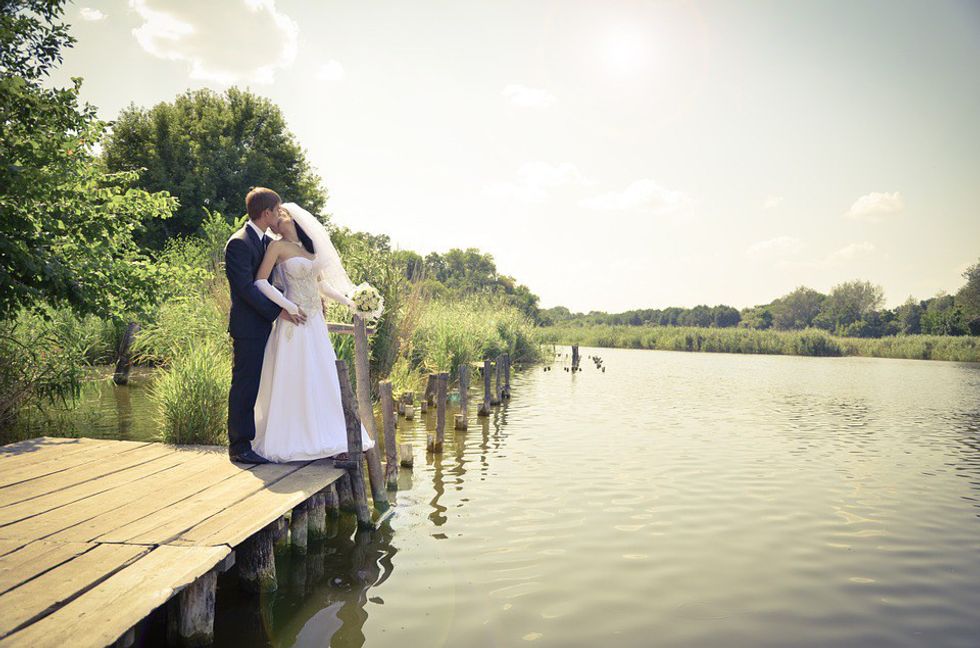The "demons" knew our names because the leaders handed them a list beforehand.
As we walked into the room which represented hell, the actors playing the demons muttered the names of group members. With every "Rebecca," "Andrew," and "Hope," I watched as every spine tensed and jerked. Shudders rippled up and down those spines.
"You've made a mistake," an actress in a gray t-shirt pleaded with a demon. "I'm a good person. I went to church. I prayed the prayer!"
"The guy in charge doesn't make mistakes." The demon seethed and beckoned the others to drag the girl away. After that, one of the demons launched himself toward us, but the main demon called him back before he touched us.
"They are not ours . . . yet," was his only remark.
Judgment house ended. We entered a room with a cluster of small group leaders eager to talk with us about our experience. I wasn't eager. I didn't talk with them.
My youth group used to flood this Christian interactive drama experience like young children flood front doorsteps on Halloween. After all, why did we let all the heathens have the fun with haunted houses?
Who needed some ghostly mansion when we could bury the depths of Hell in our church. Who needed zombies when we had actors who could play demons? Who needed the scares of this life when we had eternal fear in our grasp?
But, years later, as I distance myself from the event, I realize how this Christian Halloween tradition might be worse than the fabric for children's costumes.
For those unfamiliar with Judgment House, or events similar to it, here's the basic setup:
1. You walk through a series of rooms, usually with three basic characters: the recently converted Christian, the "good person," and a character who makes poor life decisions.
2. These three characters die through a tragic event. In years past (in my experience), certain accidents included a school shooting, a fire, and a car crash.
3. The characters visit Heaven, and the recently converted Christian walks through the celestial gates. We don't get to see what Heaven looks like.
4. The other two are banished to Hell. They are often tortured, dragged away screaming, or something of the like. We very much get to see what hell looks like.
5. The event concludes.
Here's the problem. Most Christians tend to grow frustrated with fire and brimstone preachers whose only message is "repent, you woeful sinners!" They make you wonder if they've had a devotional reading from John 3:16 recently. We wag our heads at them for their lack-of-love messages.
However, we don't do the same with the Christian "haunted" mansions. They claim they explain the love of God through the character who gets saved and enters Heaven. But, notice how we don't get to see what Heaven is like. We get a very clear depiction of Hell and judgment, on the other hand.
In succinct words: these events try to scare people into salvation.
Do I believe in Hell? Yes.
Do I want everyone to avoid the fate of Hell? Yes.
Does the idea of a place of eternal suffering scare the crap out of me? Heck, yes.
But, we shouldn't try to frighten people into loving God.
Picture this example:
You want to get married to the man or woman of your dreams. They reject your affection until a friend tells them, "Hey, if you don't get married to that person, you're going to die." (An extreme situation, I know).
So, reluctantly, they slide a ring onto your finger out of fear they could disintegrate at any moment.
Tell me, does your heart sing with this matrimony? Will it be a healthy marriage? Do we have a guarantee fear will transform into love?
In a way, trying to scare people into salvation follows this example above. Yes, Hell is a very real place. And no, I don't want anyone to go there.
But Christ's sacrifice is like a proposal. He has shown His love and devotion to us even after we scorned His rejection. It is up to us whether to accept the ring or turn him down.























